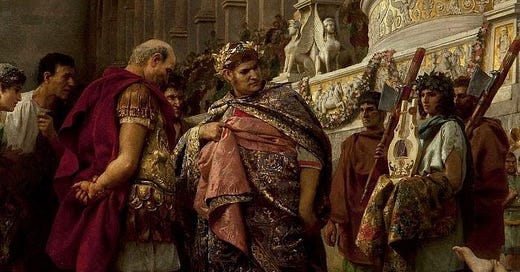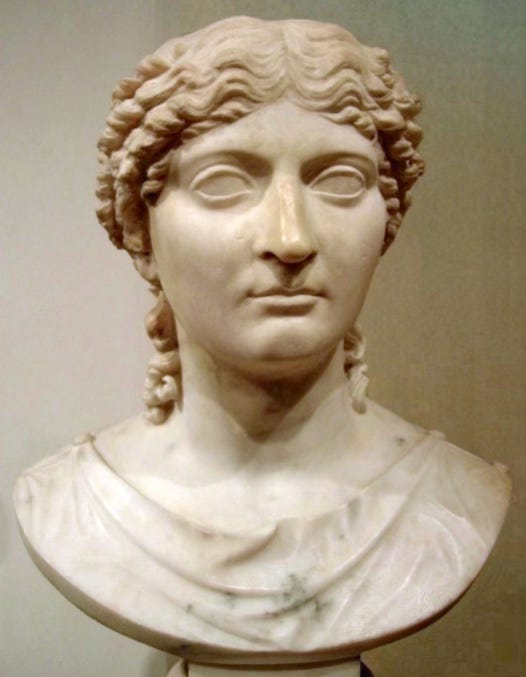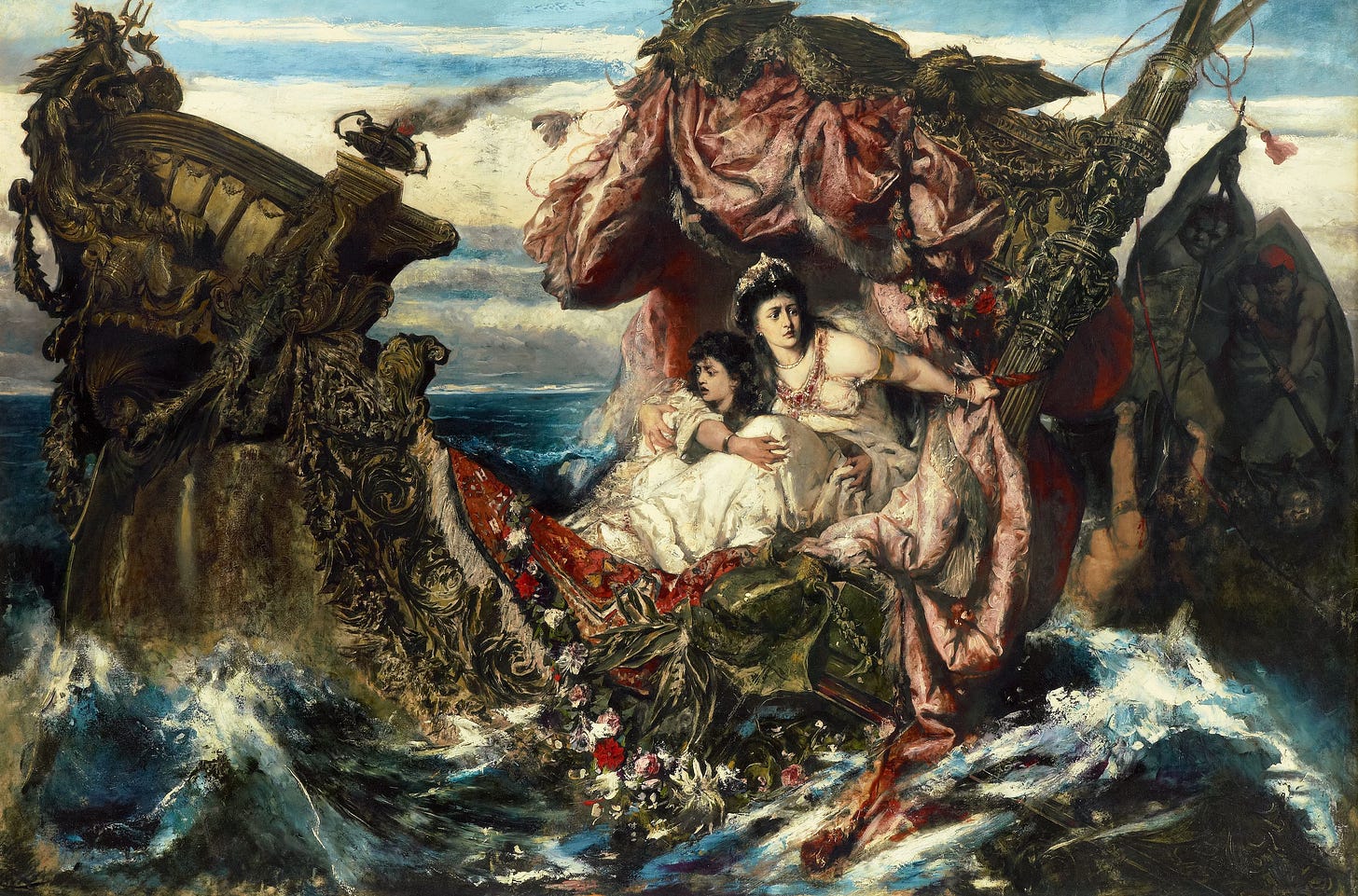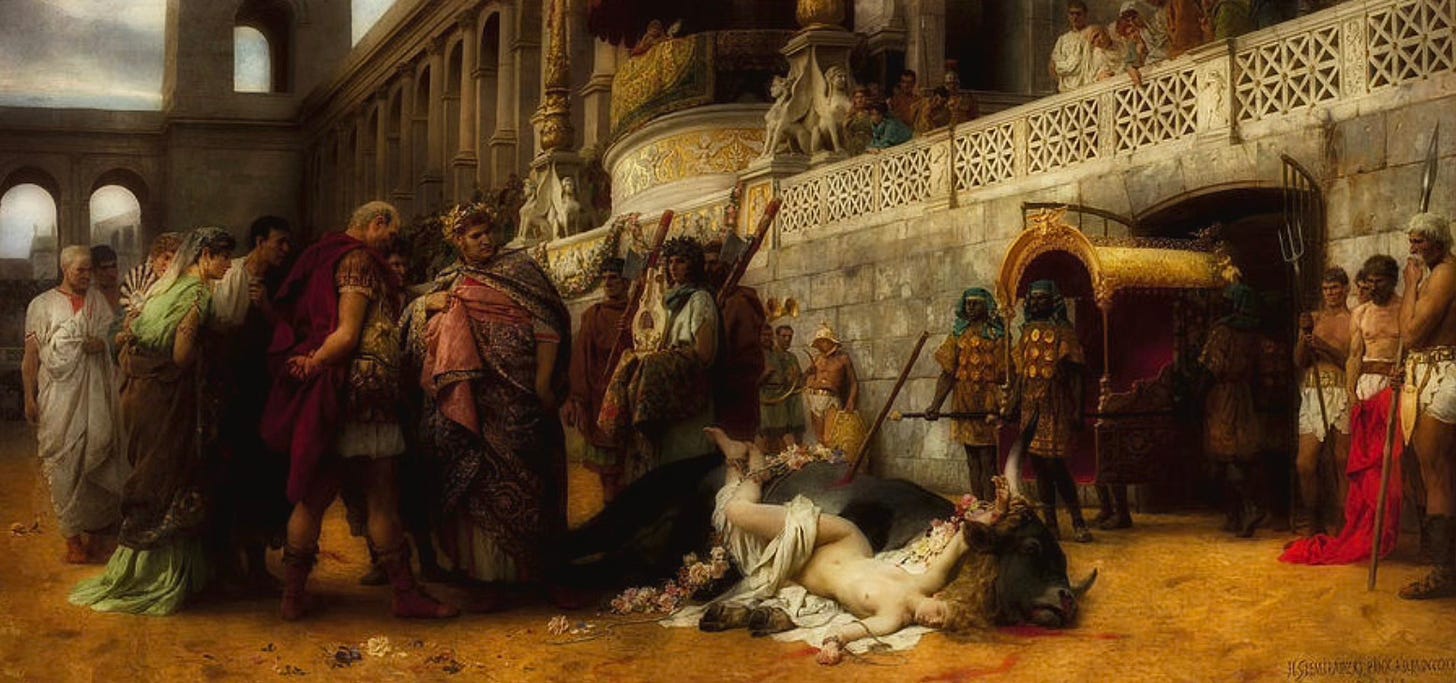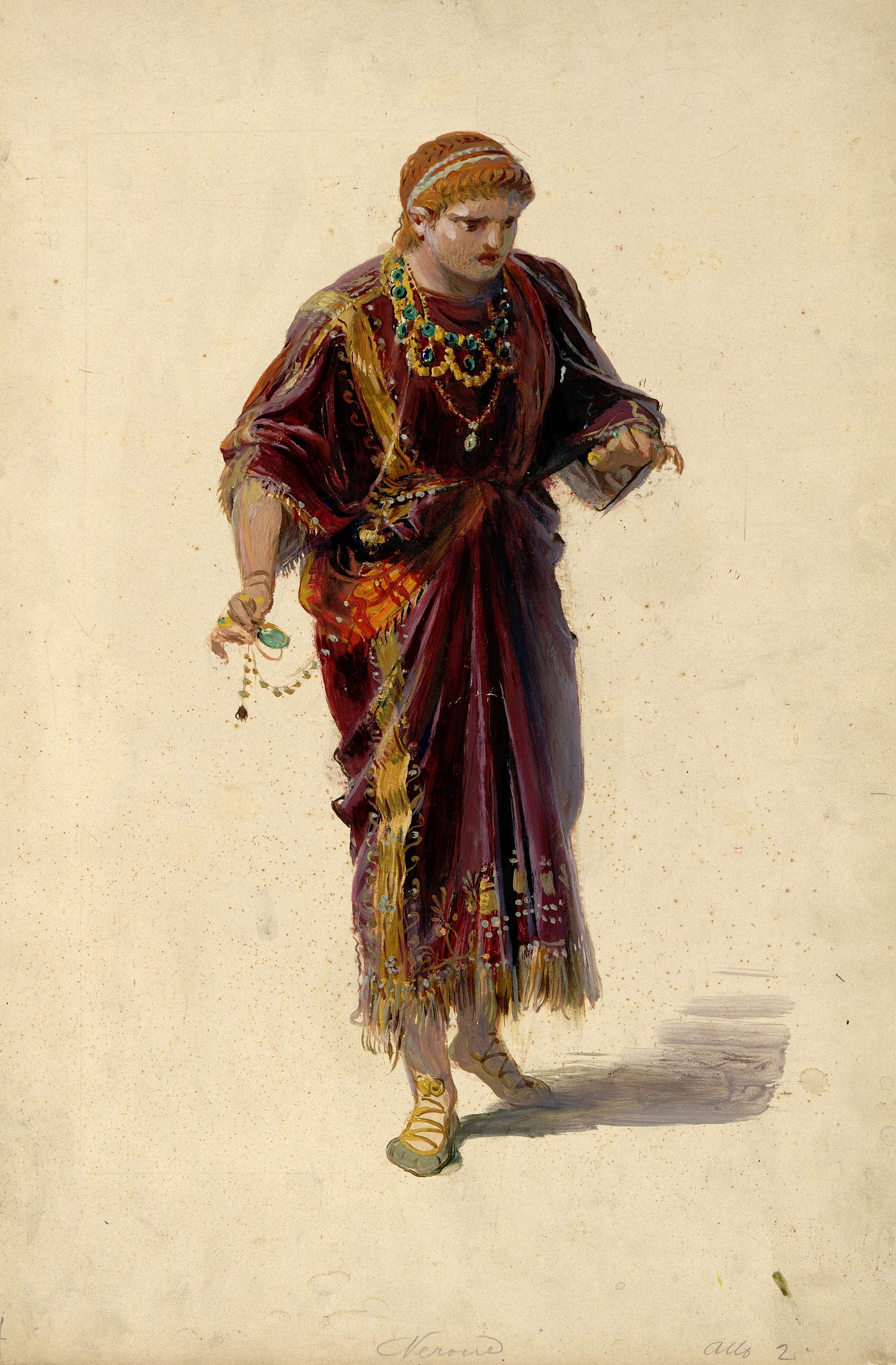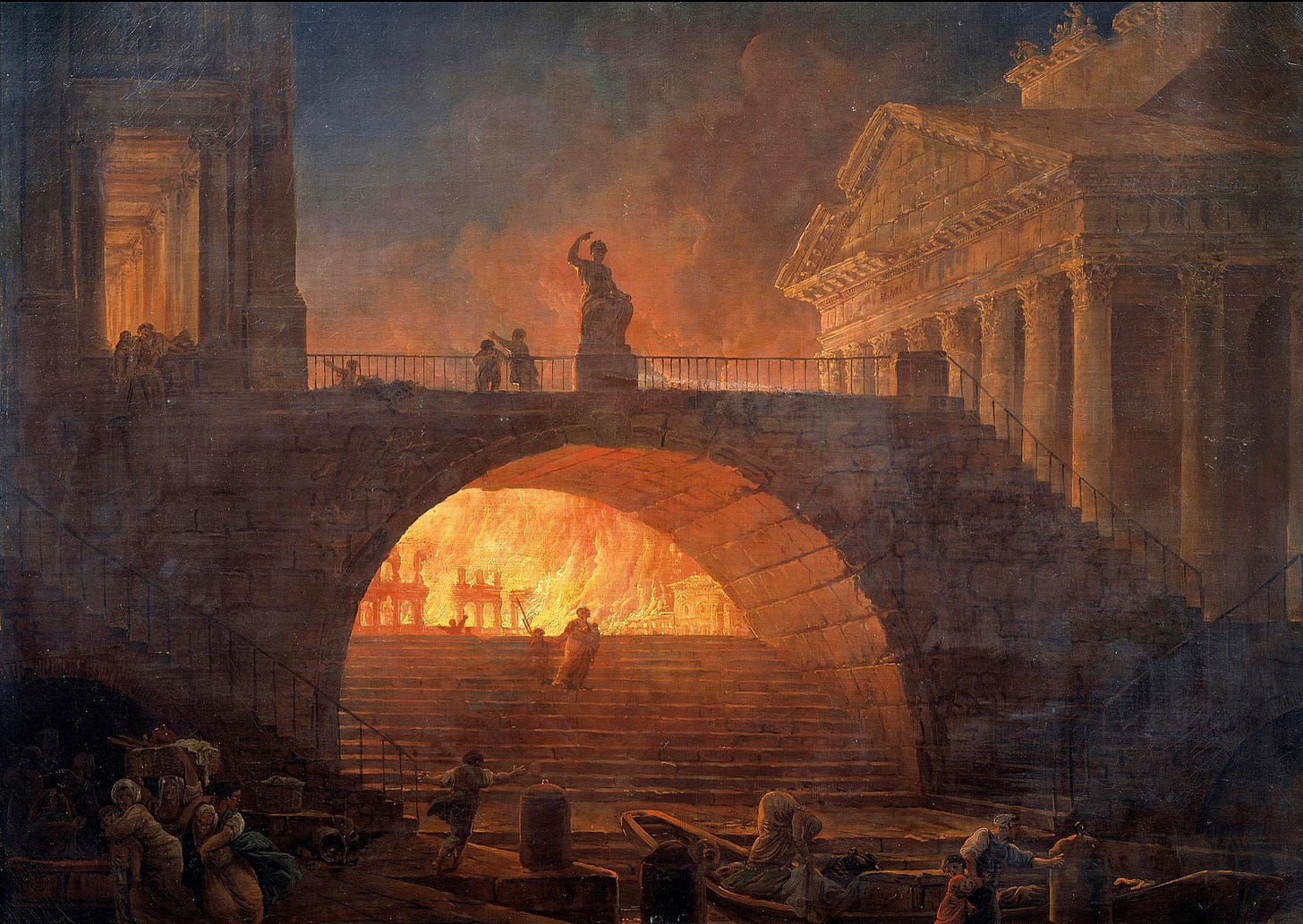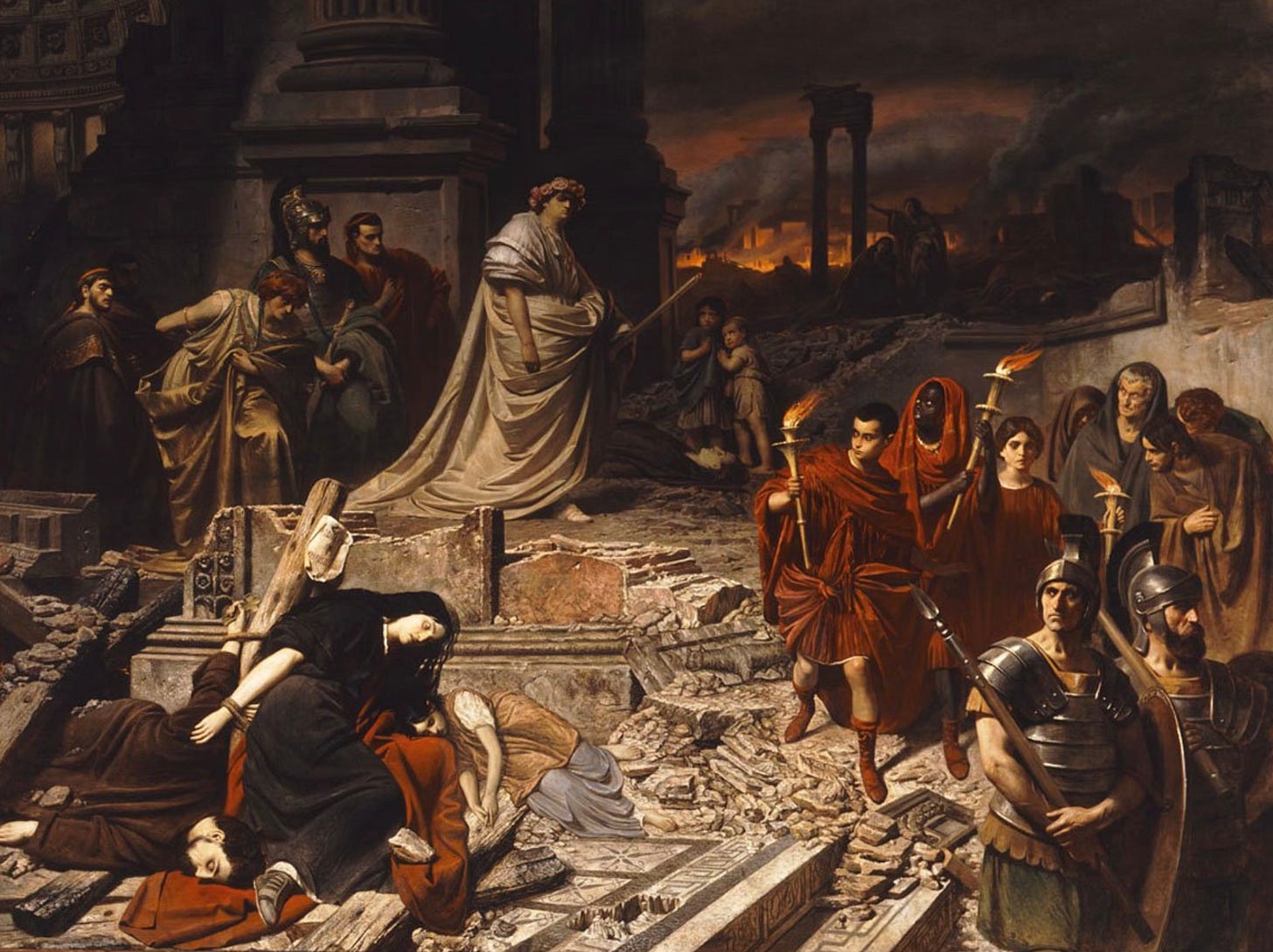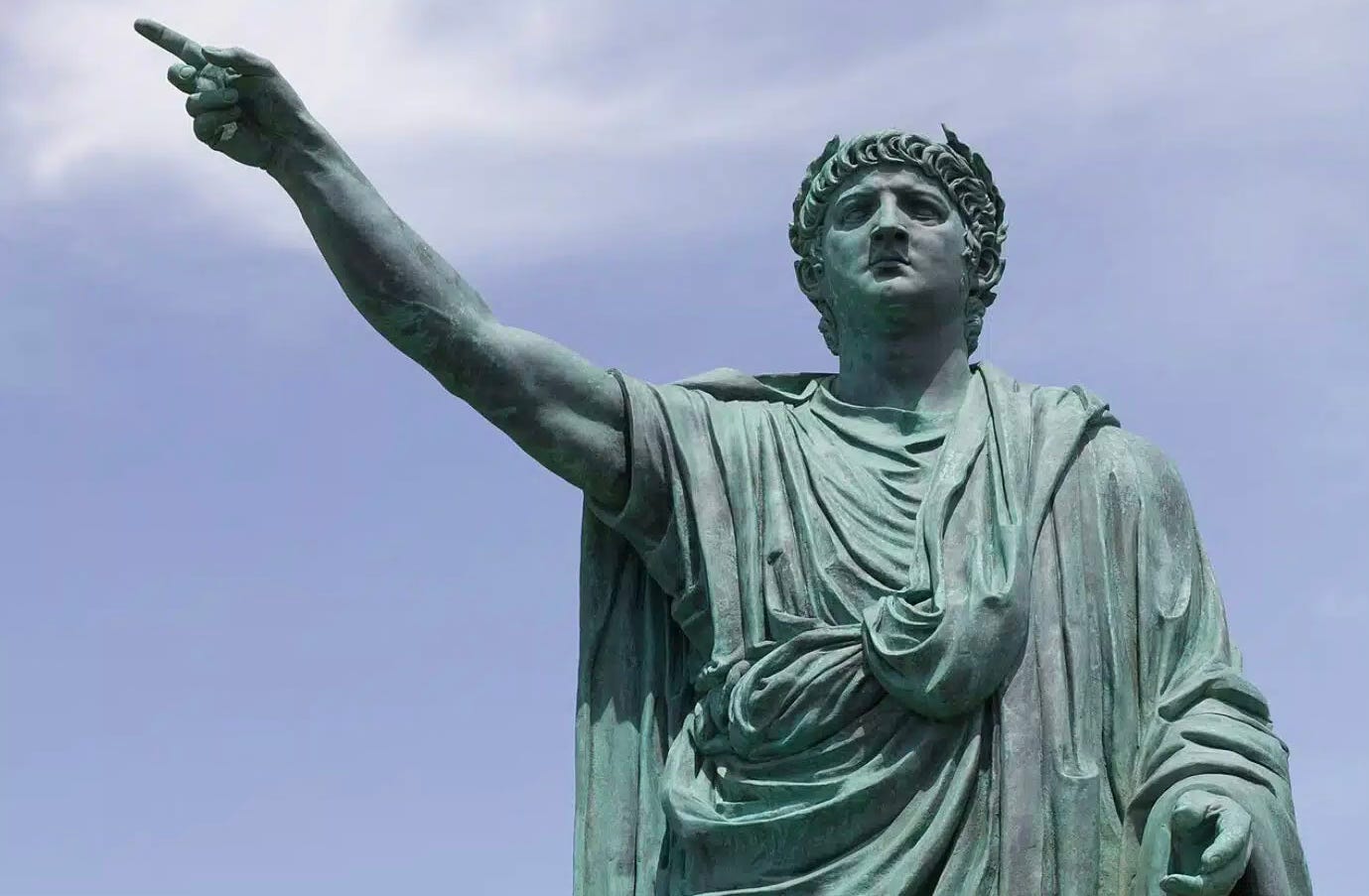Nero, one of the most, if not the most, notorious Roman emperors.
You might know him as the pyromaniac who danced and fiddled during the burning of Rome, the man who kicked his wife to death or even the devil incarnate. What if I told you all of this is most certainly not true ?
Today, I’m here to play devil’s advocate (because I love being that person) and show you that these stories may have been wildly exaggerated and that Nero is one of history’s most complicated examples of the winners writing the narrative.
As the writer of the Secret Archive, I feel it’s my duty to do justice to his story. So, who really was Nero? A foolish drunk? A maniac? An actor? A monster Before we dive into his reign, let’s start from the beginning...
So, everything started when Eve and Ada-
No, not that far…
Nero was born to Agrippina the Younger and Gnaeus Domitius Ahenobarbus. His father died when Nero was just three years old, making him not super relevant to the story. Agrippina, on the other hand, was anything but irrelevant. To say she was a "hell of a mother" would be an understatement, she was, quite literally, hell itself.
Agrippina, to put it simply, embodied the very essence of a woman wielding power. She came from an exceptionally noble lineage, she was simultaneously the sister (Caligula), wife (Claudius), and mother (Nero) of Roman emperors. She is remembered as a woman of immense ambition, unyielding pride, and an iron will capable of intimidating even the most powerful rulers. Had she been a man, Agrippina might have surpassed them all as one of Rome’s most formidable leaders.
However, Agrippina lacked one crucial quality: motherly love. Consumed by egoism and an insatiable lust for power (power that wasn’t technically hers), her very actions were directed toward gaining and preserving power.
Tragically for Nero, her ambition often came at his expense. When her brother, Emperor Caligula, ruled as a tyrant, Agrippina’s attempt to kill him failed, leading to her exile along with her son to the Pontine Islands in 39 AD During those years, she made no effort to raise him, leaving her son to be brought up by public entertainers and dancers, the lowest of Roman society. I think that Nero’s early childhood and the way he was brought up is quite important for the rest of his story.
Back from exile
When Caligula died, the throne passed to Claudius, Agrippina’s uncle. Unlike Caligula, Claudius showed much more mercy toward his niece and allowed her to return to Rome. Long story short, Agrippina seduced him and persuaded him to marry her in 49 A.D. With that, she became one of the most powerful women in Rome. But her ambition didn’t stop there, oh no. To truly satisfy her thirst for power, the emperor had to go. And, surprise, surprise, Claudius mysteriously died of poison. Hmmm, wonder how that happened?
Before Caligula’s death, Agrippina had cleverly persuaded him to adopt her son Nero as his heir in 51 AD, alongside his new stepbrother Britannicus, who was 13 at the time.
Now, as an heir, every move Nero made was being watched closely. It didn’t took long for the Senate to realize that Nero wasn’t exactly emperor material. His passions? Art, dancing, and acting. Yup, zero interest in the economical and political state of the world.
Speaking of Caligula, he also had a daughter, Octavia, who was engaged to some random guy. But Agrippina, always scheming to strengthen her status (and her son’s), accused the poor fiancé of incest (cough, cough, totally not hypocritical, coming from her). This little move conveniently led to his death . By 52 AD, Agrippina forced Nero and Octavia to marry each other because to strengthen even more his position.
After Claudius’s death, Nero, being older than Britannicus, took the throne. Officially, Nero was emperor, but let’s be real, who was always perched by his ear, watching his every move? Her name starts with an A, I’ll let you guess the rest.
Nero was growing tired of his mother attending meetings and constantly being in his way, so he tried to escape her controlling tendencies by sending her to the countryside for a while. Agrippina, however, pulled the ultimate power play by teaming up with Britannicus to bring her own son down.
Nero, having grown up watching his mother do whatever it took to seize power, definitely picked up a thing or two along the way. And that’s why, in the end, Nero decided to kill Britannicus!
Nero, growing increasingly wary of what his mother might do next to gain even more power, decided it was also time to get rid of her. With the backing of his circle, he attempted to kill her multiple times, but each time, Agrippina pulled a Rasputin on them, miraculously surviving each time. In an ultimate attempt, Nero arranged for her to be placed on a ship, intending to sink it. But, surprise! Agrippina was an excellent swimmer, and she made it back to shore.
However, when she reached dry land, she was immediately surrounded by Nero’s men, who had strict orders to finish the job.
She then (apparently) said before dying while pointing at her womb.
Stab me here, where the monster had been nurtured
What I wanted to convey by mentioning Nero’s childhood and his complicated relationship with his mother is to highlight the traumas and life experiences that shaped him. They do provide context, helping us understand that, rather than being a monster, Nero was ultimately human. As a troubled and anxious teenager, Nero likely struggled with severe mental health issues and stress, and as he grew older, these problems only worsen.
Nero is the perfect example of a child whose future was shaped entirely by forces outside of his control. It’s well-known that her mother never saw him the way one should, by using him as a tool to gain power throughout his life. And let’s not forget, he never wanted to become emperor, he would have been much happier as a simple artist.
While it’s unclear how much Nero knew about his mother’s corrupt actions, it’s hard to believe it took him long to realize that she was manipulative and willing to commit crimes to get what she wanted. She killed, lied, even tried to kill her own son.
And I won’t delve into the disturbing presumed attempt to seduce her own son in order to regain his favor, because it’s just too disgusting for me. Can you imagine how that can such an upbringing could impact one’s mental health and sanity ?
The truth is, people learn from their parents, whether they want to or not. We inevitably pick up something from them.
The Dawn of Nero
The five first years of his reign were actually pretty great : Nero took drastic steps to address the corruption that plagued Rome. He cut taxes, granted unprecedented human rights to slaves, and banned blood sports involving animals. He even reduced gladiator games, trying to replace them with Greek wrestling. His actions seemed like a breath of fresh air and his charisma made him a popular figure among Romans.
But not every one was happy to see him as king. A lot of people were actually rooting for Britannicus to become emperor, and suddenly, out of nowhere the son of Agrippina, the kid who likes to dance and sing is going to reign? Blasphemous! That was the sentiment echoing through the Roman court and in the Senate. The gossip, the strong negativity… Nero would never gain their full approval, nor that of the military, which would inevitably play huge a role in his downfall.
Emperor Nero, forever a theater kid, was often seen in plays, sometimes dressed as a woman, mingling with the public. His approachable nature earned him the love of many, especially the common people of Rome (though plenty of others saw his hobbies as degrading to the crown).
And yes, Nero was the kind of person who frequented brothels, surrounded himself with prostitutes and entertainers all of this without respecting his wife, the very esteemed Octavia. But like so many, many figures in history, considered great and remarkable, have done the same.
You have to understand that Octavia was deeply loved by the Romans. She came from a very pure lineage and thus was the perfect empress. Unfortunately, she couldn’t have a child, which led Nero to begin a wild affair with Poppaea Sabina in hopes of having an heir, and, as it turns out, he succeeded.
People were furious at the lack of respect shown to the empress, so Nero decided to divorce and exile Octavia in an attempt to make people forget about her. But that only added fuel the people’s anger. What did Nero decide to do? Well, he killed her…
He then married his pregnant mistress. Sadly for them, their child died only four months after being born in 62 AD. By this point, Nero had a body count of three, having killed his mother, his step brother and his wife. Leaving the court utterly scandalized.
At that point, Nero realized that kindness no longer held any value, as nobody respected him. The Senate refused to recognize him as a legitimate emperor and showed him no respect. He wanted, needed more than the fleeting affection of the common people, he craved real power and recognition.
And Nero’s asked himself :
The Monster
After killing Octavia, Nero descended into a perpetual nervous breakdown, indulging in feasts, orgies, and ultimately ruining Rome. He reintroduced the death penalty, plunging the empire into an era of darkness, but it was mainly the nobles who faced the risk of losing their heads, while the commoners were largely unaffected by the terror that reigned over the elite.
As his paranoia grew, Nero began using treason trials to eliminate nobles. Anyone who opposed him would die, their fortune handed over to Nero. Despite this, the common people still liked him, at least until the Great Fire of Rome in 64 AD…
When Rome Burned
In 64 AD the fire raged for nine days, tearing through Rome and leaving three-quarters of the city in ruins.
Nero fiddled while Rome burned
This is one of the biggest lie history has taken from Nero’s story. First of all, while Nero was indeed a passionate music lover and a skilled lyre player, the idea of him playing a fiddle is absurd—fiddles didn’t even exist at the time!
Secondly, Nero wasn’t even in Rome when the fire began. In fact, as soon as he heard the news, he rushed back to the city to help. He offered shelter to the homeless in his palace and began planning the city’s reconstruction.
The truth about who started the fire remains to this day unclear, but it undeniably marked a turning point in Nero’s reign. Desperate for a scapegoat, he blamed the Christians, subjecting them to brutal torture until they "confessed" to their crime.
Yet, his lavish rebuilding efforts, most notably a grand palace and a towering 120-foot statue of himself, only fueled suspicions that Nero had intentionally started the fire to clear space for his new residence. From that moment, Nero’s fate was sealed. He had officially lost the support of the people, and he felt his end closing in.
In 65 AD, after discovering another elite plot to assassinate him (again), Nero forced 23 senators involved in the conspiracy to commit suicide. His descent into "madness" worsened. Two years later, during a heated argument with his pregnant wife, Poppea, Nero presumably kicked her, leading to her death along with their unborn child.
It’s super important to note that this part of the story might not be entirely true. Most of what we know about Nero comes from three sources: Suetonius, Tacitus, and Cassius Dio—none of whom were actually alive during his reign. All three had personal beef with him, so we’ve got to take their stories with a biggg grain of salt.
After Poppea's death, Nero’s mental state spiraled further. He even went as far as forcing a 13-year-old boy to dress as his late wife and appear in public as the empress. Nero began touring the empire, staging bizarre performances dressed as Poppea.
The End of Nero
By 68 AD, back in the capital, Nero woke up to find the palace completely deserted. Realizing his time was running out, he tried to escape before his own army could turn on him. But in the end, they caught up with him.
Facing certain death, he allegedly lamented :
What an artist dies in me
He then grabbed a dagger and committed suicide with the help of a servant before his assassins were able to do so. He died at just 30, leaving a legacy of cruelty, instability, and scandal.
Over time, Nero became widely hated by Christians, who called him the Antichrist, by the Senate, the nobles, and even the people. His image morphed into the bloodthirsty maniac we know today. While much about Nero remains a mystery, one thing is clear: we need to approach early accounts with caution, given the biases of those who recorded his story.
In Defence of Emperor Nero
Am I defending Nero’s actions? Absolutely not. There’s no excusing the horrors he committed. But if we want to understand his behavior, we need to consider the fear and survival instincts that drove him. The so-called “monster” Nero became didn’t appear out of nowhere—it was shaped by the trauma he endured: a mother who barely raised him, her ruthless power plays that led to his brother’s death, and constant rejection from the Senate. With all that stacked against him, it’s no surprise he eventually cracked under the pressure.


